Eco-friendly Infrastructure Development Project
□ Project overview
- ㅇ (Duration/Total budget) 2024~2027 (Total budget: KRW 7.893billion)
- ㅇ (Project objective) To support the localization and global market entry of Rotor sail (wind-assisted propulsion system) by developing and manufacturing test equipment and establishing an accredited testing system.
- ㅇ (Project description) Development and fabrication of full-scale* test equipment for wind-assisted propulsion system (Rotor sail), and establishment of the world’s first accredited test facility** both domestically and internationally through the development of testing standards.
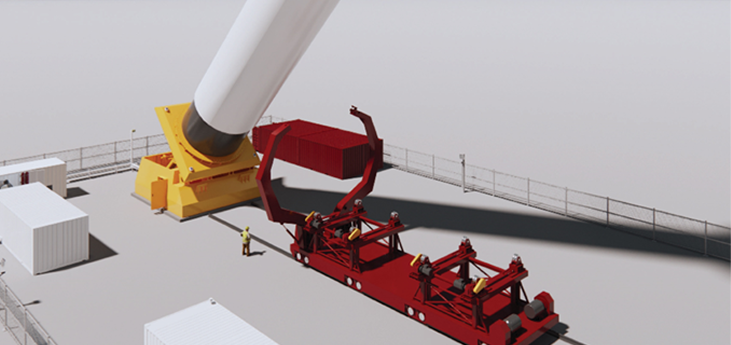
Overall layout of Full-scale Rotor Sail Test facility
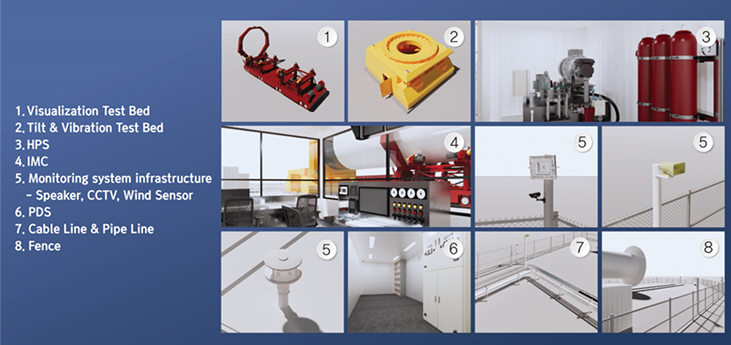
Main facilities and components
□ Project background
- ㅇ In response to strengthened environmental regulations in the maritime sector, such as the IMO's greenhouse gas reduction strategy, the shipbuilding and shipping industries are undergoing a rapid paradigm shift toward eco-friendly vessels.
- ㅇ Commercialization of wind-assisted propulsion devices is actively being pursued, particularly in the shipping industry, as a supplementary means of propulsion using wind energy.
- ㅇ There is a growing need for systematic support to enable domestic small and medium-sized enterprises (SMEs) to break away from traditional subcontracting structures with large corporations and secure new growth opportunities by independently winning overseas projects, particularly in Southeast Asia.
□ Project description
- ㅇ Support for the localization and enhancement of market competitiveness of wind-assisted ship propulsion systems through the establishment of full-scale demonstration equipment for core marine energy efficiency components (Rotor sail).
- ㅇ Detailed project activities:
□ Expected outcomes
- ㅇ Establishment of the world’s first accredited testing system for Rotor Sails.
- ㅇ Enhanced industrial competitiveness through the advancement of fuel-saving technologies using wind power as an eco-friendly energy
- ㅇ Acquisition of high-reliability product data and acceleration of commercialization through the establishment of a demonstration infrastructure for the Rotor Sail system
Smoke and Toxicity Test (IMO. FTP Code Part 2)
Where a material is required not to be capable of producing excessive quantities of smoke and toxic products or not to give rise to toxic hazards at elevated temperatures, the material shall comply with this test. The maximum specific optical density of smoke (Ds max) shall be obtained for each test. When making toxicity measurements, the sampling of fumes shall be made during the testing of the second and the third specimen at each test condition, from the geometrical centre of the chamber at the time when the maximum specific optical density of smoke is reached. The concentration of each toxic gas shall be determined as parts per million (ppm) in the chamber volume.
Performance criteria
| Surface of bulkheads, linings or ceilings | Primary deck coverings | Floor coverings | Plastic pipes | ||
|---|---|---|---|---|---|
| Dm* | ≤ 200 | ≤ 400 | ≤ 500 | ≤ 400 | |
| Toxicity | CO | ≤ 1,450 ppm | |||
| HBr | ≤ 600 ppm | ||||
| HCl | ≤ 600 ppm | ||||
| HCN | ≤ 140 ppm | ||||
| HF | ≤ 600 ppm | ||||
| SO2 | ≤ 120 ppm (200 ppm for floor coverings) | ||||
| NOx | ≤ 350 ppm | ||||
*Dm is An average (Dm) of the maximum specific optical density of smoke (Ds max) of three tests at each test condition
Specimen preparation and test fee
| Test method | Dimensions(mm) | Number required | Test fee | Remark |
|---|---|---|---|---|
| IMO. FTP Code Part 2(Smoke & Toxicity Test) | ength : 75(-1), width : 75(-1), thickness : ??25 |
12 | 2,613,000 KRW (3,135,600 KRW) | For performance verification test (For Ship register type approval test) |
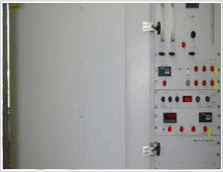
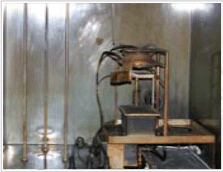
[ Smoke Density Chamber ]
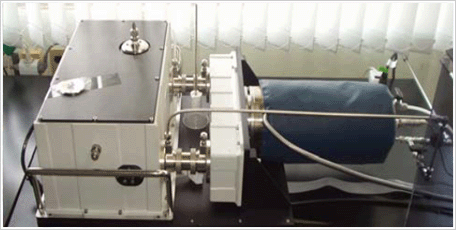
[ Gas analyzer(FT-IR) ]
Application procedures
- a)Sending the specimens and required documents including specification of the specimen.
- b)Transfering the test fees into an account belows:
- c)Specification and structure of the specimen materials should be informed prior to application.
Test for Surface Flammability(IMO. Res. a. 653(16) or 687(17))
Where a product is required to have a surface with low flame-spread characteristics, the product shall comply with this test. Where the primary deck coverings are required to be not readily ignitable, they shall comply with this test. The test method involves mounting the conditioned specimen in a well-defined flux field and measuring the time of ignition, spread of flame and its final extinguishment, together with a stack thermocouple signal as an indication of heat release by the specimen during burning. The following data shall be derived from the test results : CFE, Qsb, Qt and Qp.
Performance criteria
| Bulkhead, wall and ceiling linings | Floor coverings | Primary deck coverings | |
|---|---|---|---|
| CFE (kW/m2) | ≥ 20.0 | ≥ 7.0 | ≥ 7.0 |
| Qsb (MJ/m2) | ≥ 1.5 | ≥ 0.25 | ≥ 0.25 |
| Qt (MJ) | ≤ 0.7 | ≤ 2.0 | ≤ 2.0 |
| Qp (kW) | ≤ 4.0 | ≤ 10.0 | ≤ 10.0 |
| Burning droplets | Not produced | No more than 10 burning drops | Not produced |
*Where:
- CFE = Critical flux at extinguishment
- Qsb = Heat for sustained burning
- Qt = Total heat release
- Qp = Peak heat release rate
Specimen preparation and test fee
| Test method | Dimensions(mm) | Number required | Test fee | Remark |
|---|---|---|---|---|
| 1. IMO. Res. A. 653(16)> 2. IMO. Res. A. 687(17) | length : 800(-5) width : 155(-5) thickness* | 6 | 1,605,500 KRW (1,926,600 KRW) | For performance verification test (For Ship register type approval test) |
* Materials and composites of normal thickness 50 mm or less shall be tested using their full thickness. For materials and composites of normal thickness greater than 50 mm, the required specimens shall be obtained by cutting away the unexposed face to reduce the thickness between 47 mm and 50 mm.
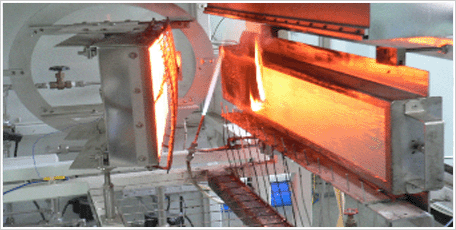
[ Smoke Density Chamber ]
Application procedures
- a)Sending the specimens and required documents including specification of the specimen.
- b)Transfering the test fees into an account belows:
- c)Specification and structure of the specimen materials should be informed prior to application.


